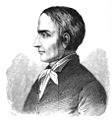Tibetology
Tibetology (
History
The
A century later another Jesuit, the
Desideri was however a pioneer, and as such what he produced were rather 'observations' on Tibet, a work he did with objectivity and sympathy, but not always perfect accuracy. The inception of Tibetology as an authentic academic discipline is thus associated with the Hungarian Sándor Kőrösi Csoma (1784–1842) who is considered as its founder to present day,[7] the other early Tibetologists of note being Philippe Édouard Foucaux who in 1842 occupied the first chair for Tibetan studies in Europe[a] and Isaac Jacob Schmidt, who was primarily the pioneering mongolist residing in Saint Petersburg.[8]
The publications of the British diplomat
In recent decades, particularly in English-speaking countries, the study of Tibet and Tibetology has opened out towards other disciplines, prompting works with an interdisciplinary approach. This has become most obvious in the regular conferences of the IATS (International Association of Tibetan Studies), held at intervals of three years in different cities around the world. Examples of such broader-based research include the work of the American anthropologist Melvyn Goldstein, among others, who has produced publications on subjects such as lexical questions, Tibetan nomadism, and the modern history of Tibet. Other recent research includes the work of Robert Barnett, Matthew Kapstein, Elliot Sperling, Alex McKay, Geoffrey Samuel, Flavio Geisshuesler, among others.[10]
Gallery
-
Professor Turrell Wyliein 1979 at the University of Washington Department of Asian Languages and Literature
-
David Germano in 2013
-
Giuseppe Tucci (1894-1984) Italian Tibetologist drinking butter tea in Tibet in the 1930s
-
Elliot Sperling 2014
-
Sir Charles Alfred Bell, Author of the "Biography of the Dalai Lama" about the 13th Dalai Lama
-
Sándor Kőrösi Csoma authored the first Tibetan-English dictionary
-
Hugh Richardson in Tibet about 1940
-
The Jesuit priest, Antonio de Andrade, born 1580, died 1634 was the first known European to have visited Tibet
See also
- Buddhist Digital Resource Center
- China Tibetology Research Center
- International Seminar of Young Tibetologists
- Vajrayana Buddhism
References
Notes
- ^ At the school of Oriental Studies in Paris. See:Le Calloc'h, Bernard. "Philippe-Edouard Foucaux: First Tibetan teacher in Europe." Tibet Journal 12.1 (1987): 39-49.
Citations
- ISBN 978-1-932476-45-3. Retrieved 2024-03-11.
- ISBN 978-1-317-98059-9. Retrieved 2024-03-11.
- ISBN 978-1-4735-5022-3. Retrieved 2024-03-11.
- ISBN 978-0-253-01309-5. Retrieved 2024-03-11.
- ^ Chapman, F.S. (1940). Lhasa the Holy City. Readers Union Limited.
- ISBN 978-1-000-63728-1. Retrieved 2024-03-11.
- ISBN 978-963-05-4361-3. Retrieved 2024-03-11.
- ISBN 978-0-19-758105-6. Retrieved 2024-03-11.
- ^ Bell, C.A. (1927). Tibet, Past & Present. Oxford University Press : H. Milford. p. 175. Retrieved 2024-03-11.
- ISBN 978-0-7914-8585-9. Retrieved 2024-03-11.
- JSTOR 43300372.
- ^ "One Hundred Thousand Moons: An Advanced Political History of Tibet". Brill.com. Brill. Archived from the original on 16 March 2016. Retrieved 13 February 2018.
- JSTOR 41302243.
Other sources
- Tsering Shakya: The Development of Modern Tibetan Studies. In: Robert Barnett (Hg.): Resistance and Reform in Tibet (Bloomington/Indianapolis, Indiana University Press 1994), ISBN 0-253-31131-4, S. 1–14.
- SHAKABPA, W. D. 1967. Tibet: A Political History [With plates and maps.]. Yale University Press: New Haven & London.





![Shakabpa on the Tibetan Passport 1947 issued to Wangchuk Deden Shakabpa (Tibetan: ཞྭ་སྒབ་པ་དབང་ཕྱུག་བདེ་ལྡན།), then "Chief of the Finance Department of the Government of Tibet"[11][12][13]](http://upload.wikimedia.org/wikipedia/commons/thumb/f/f3/Passeportshakabpa2.jpg/99px-Passeportshakabpa2.jpg)



